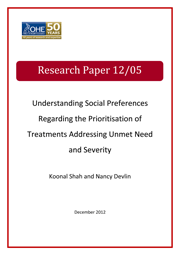Sign up to our newsletter Subscribe
Challenges and Solutions for Budget Impact Analysis of Gene Therapies

Sign up to our newsletter Subscribe

The proposals from the UK Department of Health (DH) for value based pricing (VBP) include a process whereby higher prices would be granted to medicines that tackle the most burdensome diseases – i.e. those that are most severe or are…

The proposals from the UK Department of Health (DH) for value based pricing (VBP) include a process whereby higher prices would be granted to medicines that tackle the most burdensome diseases – i.e. those that are most severe or are associated with the greatest unmet need. The DH’s VBP consultation document defines unmet need in terms of the degree to which alternative treatments exist. Little empirical evidence is available, however, on whether the general public supports the use of this particular definition of unmet need as a basis for setting health care priorities. To address this gap in the evidence, Koonal Shah and Nancy Devlin of OHE completed a small exploratory study.

The proposals from the UK Department of Health (DH) for value based pricing (VBP) include a process whereby higher prices would be granted to medicines that tackle the most burdensome diseases – i.e. those that are most severe or are associated with the greatest unmet need. The DH’s VBP consultation document defines unmet need in terms of the degree to which alternative treatments exist. Little empirical evidence is available, however, on whether the general public supports the use of this particular definition of unmet need as a basis for setting health care priorities.
To address this gap in the evidence, Koonal Shah and Nancy Devlin of OHE completed a small exploratory study, reported in the most recent OHE Research Paper. The aim was to design and test an approach to eliciting public preferences about setting priorities for health care based on unmet need and disease severity. In face-to-face interviews, 60 respondents each answered 11 questions about setting health care priorities, many of which involved choosing between achieving large health gains, treating the severely ill, and addressing areas of unmet need.
The key findings of the study are:
Download Shah, K. and Devlin, N. (2012) Understanding social preferences regarding the prioritisation of treatments addressing unmet need and severity. Research Paper 12/05. London: Office of Health Economics.
Access to OHE publications is available free of charge to registered users. OHE’s slide presentations are available at http://www.slideshare.net/OHENews.
An error has occurred, please try again later.
This website uses cookies so that we can provide you with the best user experience possible. Cookie information is stored in your browser and performs functions such as recognising you when you return to our website and helping our team to understand which sections of the website you find most interesting and useful.
Strictly Necessary Cookie should be enabled at all times so that we can save your preferences for cookie settings.
If you disable this cookie, we will not be able to save your preferences. This means that every time you visit this website you will need to enable or disable cookies again.
This website uses Google Analytics to collect anonymous information such as the number of visitors to the site, and the most popular pages.
Keeping this cookie enabled helps us to improve our website.
Please enable Strictly Necessary Cookies first so that we can save your preferences!